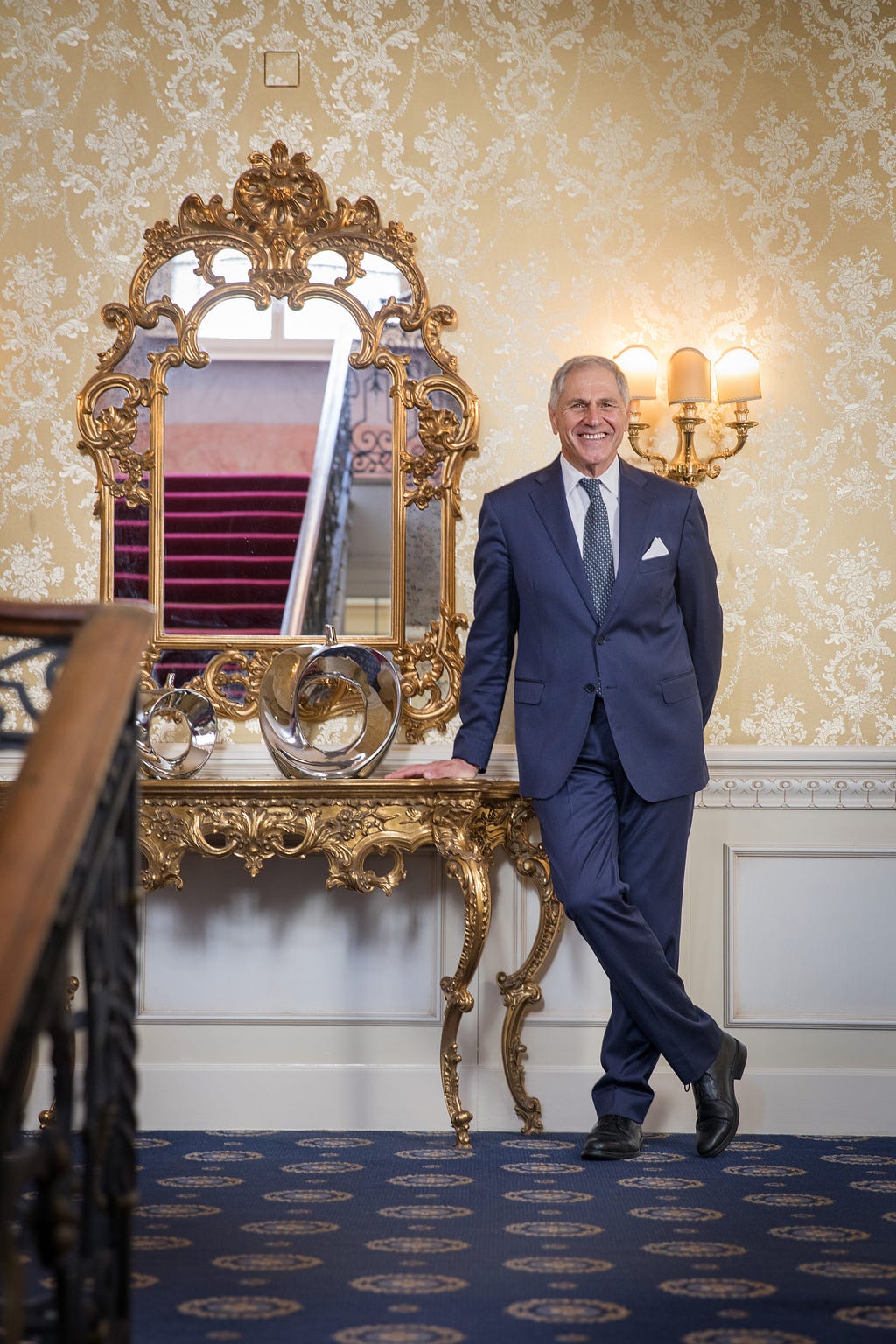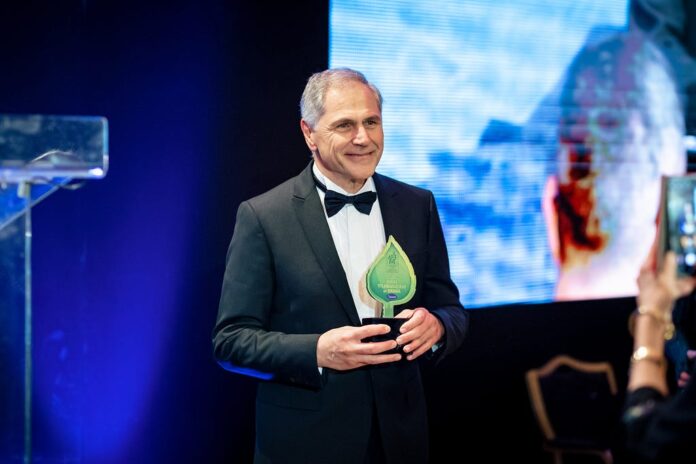An Interview With Monica Sanders
“Everyone has to do his or her part”: the goal can only be achieved as a team, no one excluded.
According to the University of Colorado, “Those who are most affected and have the fewest resources to adapt to climate change are also the least responsible for the greenhouse gas emissions — both globally and within the United States.” Promoting climate justice is an incredibly important environmental responsibility that is slowly becoming more and more recognized. In this interview series, we are talking to leaders who are helping to promote sustainability and climate justice. As part of this series, we had the pleasure of interviewing Giuseppe Rossi.
A glance is all it takes to perceive a person’s charisma. As managing director of Switzerland’s historical Splendide Royal Hotel in Lugano for the last 15 years, Rossi has managed successfully to combine both the past and future, that is, the age-old tradition of hospitality found in the 19th-century Palace together with a pioneering vision towards sustainability.
Thank you so much for doing this with us! Before we dig in, our readers would like to get to know you a bit. Can you tell us a bit about how you grew up?
I spent my childhood in the heart of Naples. I attended a hotel management school near Rome and then began, at a very young age, by traveling around Europe, learning more about the world of 5-star hotels. Being curious, wanting to discover and to experience new realities-these led me to several different countries, where I learnt a lot. Later I chose Lugano as my city, which is where I established my family.
Everyone has a cataclysmic moment or marker in their life which propels them to take certain actions, a “why.” What is your why?
I dedicated a lifetime to serve others, for me this is not a job, it is a calling. Since childhood, as the oldest child whose both parents worked, I took care of my younger sisters. This formed me, and since then I understood that caring for others would be my calling, which also happened to be my passion. My profession has enabled me to pursue and cultivate my mission.
You are currently leading an organization that is making a difference for our planet. Can you tell us a bit about what you and your organization are trying to change?
Since 2015 the Splendide has been on its journey towards a more sustainable approach in hospitality. Today, sustainability is not only a method of working, but an obligation to the coming generations in trying to protect the natural resources and beauty that surround us, as well as an ethos of being supportive of the land that hosts us. In our own small way, we want to help to change people’s approach to the environment: from our employees to our guests to our suppliers to ensure that everyone is conscious that natural resources are not infinite and should be consumed sparingly while working on alternative and greener solutions.
Can you share the most interesting story that happened to you since you began leading your company or organization?
My professional background started precisely at the Splendide in Lugano, where I began my career. This hotel was a true institution for me, with its long history of hospitality and this fascinating 19th-century structure. I could never have imagined, one day, becoming its Director. Believe me, never. But then that’s exactly what happened. For me, this is the most beautiful story, in fact it is almost a fairy tale.
None of us can be successful without some help along the way. Did you have mentors or cheerleaders who helped you to succeed? Can you tell us a story about their influence?
My predecessor played a fundamental role in my professional history. Aniello Lauro was the director of the Splendide when I was just a boy working at the front desk: he was the one who believed in me and, at one point, told me that, in order to learn more, I should leave Lugano and gain experience around the world. When I returned to Ticino, he was the one who prepared me for this role and worked on getting me to take his place. I owe him a great deal.
Thank you for that. Let’s now move to the central part of our discussion. Let’s start with a basic definition of terms so that everyone is on the same page. What does climate justice mean to you? How do we operationalize it?
Climate justice means responsibility, in particular to the younger generation, as mentioned earlier. We cannot ignore this inspiring concept in our daily work. The tourism industry works on enhancing destinations, and we work to preserve the natural and environmental beauty of our city, Lugano.
We have reduced CO2 emissions by 50 percent in just a few years, through significant investments in infrastructure and machinery that have led to resource optimization. Our Splendide Sustainability program has, little by little, broadened on several fronts and today touches all sectors of corporate social responsibility. This means that, in addition to the due actions to lower our environmental footprint, we are also active on the social level with actions to support the realities of the territory, whether social, institutional, or economic. A 360-degree commitment that we were acknowledged for last February in Lisbon, with the EHMA Sustainability Award by Diversey, which is for me and for the entire Splendide a source of great pride.
Science is telling us that we have 7–10 years to make critical decisions about climate change. What are three things you or your organization are doing to help?
Our contribution, while small, counts for much more than three actions. If I had to choose, I would say that energy and emissions management, waste issues, and innovation are the top three issues, in this regard. However, I believe that all sustainable issues are linked, which is why we focus on individual actions, but always looking in the totality of our program, which touches all sensitive areas. For example, respect for human rights might seem like a marginal factor in a context like Switzerland, but it is the basis for being able to work peacefully, and we should never forget that.
Are there three things the community, society, or politicians can do to help you in your mission?
Nothing would be possible without the support of the community, society, and politicians. Sustainability is a team game; no one can believe that they can act alone, partly because the results would not be the same. Active support and participation are two things that can’t be missed, and by support I also mean rewarding those who are committed to it. For example, the Swiss confederation has a program to tax companies where parameters of renewable energy use have been met.
How would you articulate how a business can become more profitable by being more sustainable and more environmentally conscious? Can you share a story or example?
I am more than convinced! Sustainability will pay off, and those who do not “catch this train” will find themselves out of business. There’s no denying that tourists are becoming more environmentally conscious and are also choosing their hotel based on its approach to this issue.
A few guests who did not previously choose the Splendide have now become regulars and stay with us after having experienced our sustainable approach and having experienced it for themselves.
To provide a specific example, I can mention our green rooms (rooms with a responsible approach toward raw materials and saving resources). A more careful use of changing bed and bath linens has led to water savings (and consequent savings on utility bills) and also a reduction in textile costs.

This is the signature question we ask in most of our interviews. What are your “5 things I wish someone told me when I first started promoting sustainability and climate justice” and why?
More than what I wish someone had told me, I list what I have learned over the years.
1. “Sustainability is not a short-term investment”: it requires patience and foresight to see the rewards of commitment. Investments can be substantial, but eventually they will bear fruit.
2. “Not everyone has this kind of sensitivity”: it is an undeniable fact that there is a different approach to sustainability for each person. I do believe that involving people in our project helps and helps to share the same ideals.
3. “Everyone has to do his or her part”: the goal can only be achieved as a team, no one excluded.
4. “Continuous staff development is the basis of good work”: a program is not sufficient if people do not know how to contribute. That is why training has become a workhorse for our Hotel.
5. “The importance of a sustainability committee”: if I went back, I would establish it from the very beginning of the project. Now we have it, and it is greatly needed. In addition to management, all sectors need to be part of this group, also in order to provide substantial input on how to improve practical processes related to sustainability.
Is there a person in the world, or in the US with whom you would like to have a private breakfast or lunch with, and why? He or she might just see this, especially if we tag them. 🙂
I would love to have breakfast with Al Gore, I admire his foresight, commitment, and expertise. I think a person who can put something as important as running for president of the United States on the back burner, prioritizing environmental values and commitment, is a great example.
How can our readers continue to follow your work online?
We have provided a section on our website devoted entirely to our sustainable efforts, where one can learn about our Splendide Sustainability guidelines. With the new site that will give way in the fall, we’ll try to share all of our goals, including the smaller ones, to make the public aware of all the little and great actions put in place.
This was very meaningful, thank you so much. We wish you only continued success on your great work!
About the Interviewer: Monica Sanders JD, LL.M, is the founder of “The Undivide Project”, an organization dedicated to creating climate resilience in underserved communities using good tech and the power of the Internet. She holds faculty roles at the Georgetown University Law Center and the Tulane University Disaster Resilience Leadership Academy. Professor Sanders also serves on several UN agency working groups. As an attorney, Monica has held senior roles in all three branches of government, private industry, and nonprofits. In her previous life, she was a journalist for seven years and the recipient of several awards, including an Emmy. Now the New Orleans native spends her time in solidarity with and championing change for those on the frontlines of climate change and digital divestment. Learn more about how to join her at: www.theundivideproject.org
How Giuseppe Rossi Is Helping to Promote Sustainability and Climate Justice was originally published in Authority Magazine on Medium, where people are continuing the conversation by highlighting and responding to this story.


